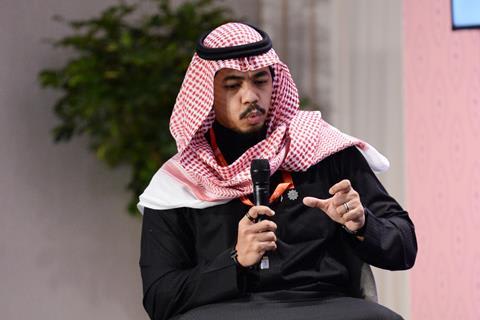Saudi Arabia sets sights on 100 feature films in the country by 2030
Minister says "we are building the value chain to reach that target"
By Melanie Goodfellow 10 Dec 2021

The Saudi government has set a target of producing and shooting 100 films in the country by 2030 and is determined to create the infrastructure to make this happen, according to an official from the ministry of investment.
“We know that we cannot reach it in a day or in a year. It’s like a walk and we are doing it step by step,” said Bahaa Abdulmajeed, a business development manager at Saudi’s ministry of investment.
“We did an internal assessment, and we know that we have many gaps across the value chain – from pre-production, production, post-production, talent development. We are building this value chain to reach our target, which is the one hundred [films].”
By comparison, some 70 local and international films have shot in the United Arab Emirates since it started buildings its cinema infrastructure in the early 2000s.
Abdulmajeed was speaking at an industry talk at the Red Sea International Film Festival on Thursday (December 9) about the ongoing shoot of Ric Roman Waugh’s big-budget action picture Kandahar in Saudi’s world heritage site of AlUla, where the government has invested in building infrastructure for tourism and filming.
He said the government’s strategy for building a film industry revolved around three pillars: creating a regulatory framework; devising an incentive, the details of which have yet to be announced; and building infrastructure, which included developing talent.
“We know the gaps and we see these gaps as opportunities for the private sector. But we are fully aware that if we go to a local company today and ask them to have an infrastructure project, it’s too big for them, they cannot do it. So, the government will step in,” he said citing projects such as the transformation of AlUla as an example.
Abdulmajeed said welcoming big-budget productions like Kandahar to AlUla was a part of the strategy for building a sustainable sector for the future.
Produced by Thunder Road Films and Capstone, the production sees AlUla stand in for Afghanistan, having previously doubled for Iraq in Anthony and Joe Russo’s Cherry.
“We’ve been shooting for two weeks and have been prepping for a year and a half now. We chose an unusual time in the world. I won’t deny it’s been a challenge, shooting and prepping during Covid,” said Film AlUla’s Stephen Strachan. “I think Kandahar is the movie that’s driving Saudi forward into being able to handle big feature films like this. We have 450 people on the ground at the moment associated with Kandahar. We were originally told it would be 250, but it’s actually 450.”
In an example of the Saudi government’s support for big productions shooting in the country, Strachan recounted how the country’s Ministry of Defence had suppported the productions of both Cherry and Kandahar.
“It began with Cherry, which we filmed in January, February of 2020, just before the Covid pandemic. Cherry was building a battle sequence, and they needed a lot of armaments, a lot of vehicles. For that battlefield, we had seven amoured personnel carriers, three Abrams tanks that came down to AlUla from the military base in Tobuk, seven Blackhawk helicopters and four Air15 jets,” said Strachan.
Christian Mercuri at Capstone, who is lead producing Kandahar, echoed Strachan’s comments on the role the production would play in helping Saudi to develop its film industry.
“This isn’t just a local film, it’s an international global appeal film. It’s going to be released in the States, probably Q4, next year wide, on at least 2,500 screens, and it’s going to be that way all over the world, including here in this region,” he said.
He acknowledged that shooting a production of this size is challenging given the current lack of infrastructure and trained crew but had high hopes for the country’s cinema ambitions.
“With the government support and what they’re doing, there’s no reason why this cannot be the biggest film hub in the Middle East, which I know it will be, if not one of the biggest in the world,” he said. “By 2025, 2030, I think this is a place where I know I’m going to try to bring a lot of productions, and I think I won’t be the only one.”
Latest news & features
Promote your services with KFTV
Choose from three profile types - Basic, Silver and Gold
Create ProfileWe offer a range of display advertising opportunities.
Learn More